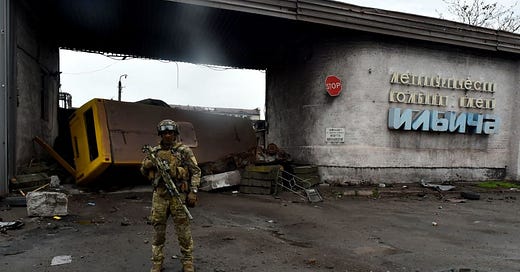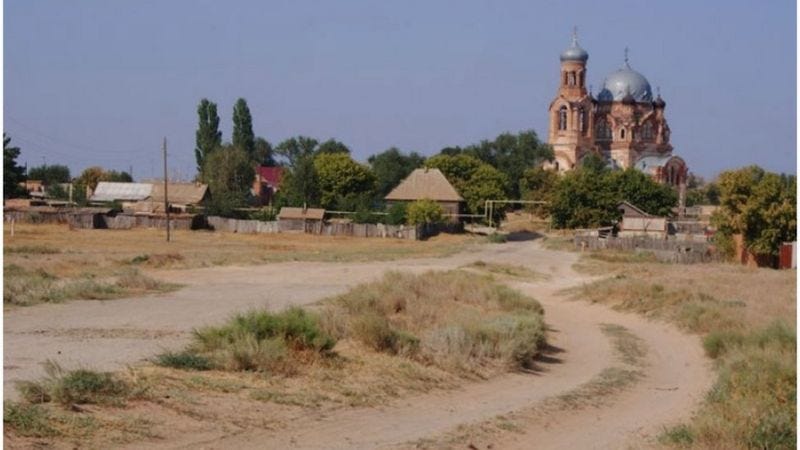From Starbucks to steelworks: How a businessman linked to Ramzan Kadyrov benefited from the war in Ukraine
BBC investigation shows that entrepreneurs linked to the Chechen leader have started to receive assets from the captured Ukrainian cities.
By Ksenia Churmanova.
People close to the Chechen leader Ramzan Kadyrov fought in Ukraine, and now they have started to receive assets from the captured Ukrainian cities. At the end of January, Chechen businessman Valid Korchagin became the co-owner of a company ‘MMK Ilyicha’ registered in the self-styled DPR (Donetsk People’s Republic). This company may be rebuilding the metal plant in Mariupol destroyed as a result of Russian invasion. The BBC discovered that Korchagin is linked to the family of senator Suleiman Geremeyev, a close associate of Kadyrov. During the war, the young Chechen businessman also gained shares in the Russian branch of construction supply retailer OBI, and shops owned by the departing coffee shop chain giant, Starbucks.
On August 19th, a plume of smoke rose over the Mariupol steelworks. Ukrainian authorities said the equpment of the damaged plant was beginning to be dismantled by the occupying forces; Russian news sites stressed that the clearing of mines and rubble on the site were still underway.
The Ilyich metal plant is one of the most important businesses in Ukraine, owned by Ukrainian entrepreneur Rinat Akhmetov and his company Metinvest. 35,000 people worked at the Mariupol site. During the siege of Mariupol at the beginning of the war, the plant was partially destroyed.
Russian forces captured Mariupol in the third month of the invasion. The ruined city was placed under the control of Chechen troops, some of whom were close to Ramzan Kadyrov. “Our soldiers are bravely carrying out their duty,” wrote Kadyrov on his Telegram chanel. “One of them is my dear BROTHER, Ruslan “the Kind” Geremeyev, who is playing an active part in liberating Mariupol.”
The occupying authorities of the self-styled DPR aimed to start restoring the Mariupol metal plant last year. “We’re planning to repair the Ilyich plant. There is a plan. In fact, I think the investor will explain it himself in the very near future, as soon as all the relevant decisions have been made,” said the ‘Prime Minister’ of the so-called DPR, in October.
The Russian Ministry of Construction even issued its estimates: repairing the Azovstal factory and the Ilyich metal plant would create more than 9,000 jobs.
But so far it is on paper only, there is just a company with the same name as the metal plant. ‘MMK Ilyicha’ was registered last August, by the Donetsk ‘Ministry of Income and Fees’. It appeares to have its address in the town of Makiivka, which has been part of the occupying DPR since 2014.
The director of ‘MMK Ilyicha’ is Yuri Muray, a Ukrainian entrepreneur and resident of Makiivka. After the outbreak of war in 2014, several legal entities tied to Muray were registered in the DPR. On his page in VK (VKontakte - Russian version of Facebook), Muray posts in support of the war, sharing content from Ramzan Kadyrov’s page and online groups named “The Armed Forces of Novorossiya,” and “Great Rus! Russians don’t surrender!”
Muray refused to talk about ‘MMK Ilyicha’ with the BBC in detail, but confirmed that the company is, indeed, connected to the Mariupol steelworks. “The business is in Makiivka, and the factory is in Mariupol,” he said. And then added: “Why don’t you come and visit us in Mariupol, we’ll explain everything.”
Yet, it is unclear where the money to restore the captured factory will come from: out of the pocket of Mr Muray and his partner or from the Russian state budget. In fact, nobody knows either the sources of financing or the plan of renovation, confirms Ilya Shumanov, head of ‘Transparency International – Russia.’ He assumes that as the steel production will be needed to supply other construction sites and rebuilding of public infrastructure, this means that there will be state funds allocated for it.
Yuri Muray would not answer questions about his new business partner. At the end of January, Valid Korchagin – a businessman from the ancestral village of Kadyrov’s associates – became a co-owner of ‘MMK Ilyicha,’ receiving a 50 percent share of the company.
What we know about Valid Korchagin
We looked up all publicly available data on Valid Korchagin and beleive that the 25-year old entrepreneur was born in the village of Prishib in Astrakhan region. The village is in the east of the region, not far from Kamykia.
There was a dispute here in 2013: a resident of Prishib built a mosque in his backyard, to the dismay of his neighbours. Even the governor of Astrakhan region stepped in to oppose the building. The case ended up before a judge, and the landowner, allegedly, managed to convince the court that he was building a barn, not a mosque. As a result, the mosque was left to be, and was included into the land registries, an official from the Prishib village council told the BBC.
The BBC has also learned that the registered address of one Valid Vakhitovich Korchagin was on the same street as this mosque. The street was also home to Vakhit Sadulaevich Geremeyev – most likely, his father. These days, Vakhit Geremeyev is a well-known official in Chechnya.
In 2016, Vakhit Geremeyev was already in Chechnya as acting head of Nozhay-Yurtovsky district. His job included holding emergency meetings about ‘flagrant cases where certain directors have shown a careless attitude towards state symbols and portraits of top officials.’ Geremeyev is now deputy head of Chechnya’s Ministry of Construction.
Vakhit Sadulaevich Geremeyev is the brother of Suleiman Sadulaevich Geremeyev, a senator on the Federation Council (Russian parliament’s upper chamber). Suleiman was placed on international sanctions lists for his work as a senator at the start of the war in Ukraine.
An official from the Prishib village council claimed that Geremeyev left the village before the incident with the mosque: “They all left, they’re all in Chechnya.” He had not heard of Valid Korchagin, but said that the Geremeyevs were friends with the Korchagins from the neighbouring village of Fedorovka, Astrakhan region.
The BBC tracked down Valid Korchagin’s contacts. According to the app Getcontact, which shows the names under which a user’s phone number is saved by their friends, Korchagin is known by various names: “Valid Geremeyev,” “Valid Geremeyev (Korchagin)”, “Valid Vakhitovich Korchagin,” “Valid Giremeev, Vakhit’s son.” Shortly after a BBC correspondent had searched for this information on Getcontact, all tags with the Geremeyev surname were removed. The BBC still has the original screenshots.

Until 2021, Korchagin’s VKontakte profile used the surname “Geremeyev,” which can still be seen on the archive version of the page. But by April 2021, he was using the name Korchagin on documents. A case was then filed against him in a court in Chechnya, by a businessman Usman Machiev, who wanted to recover a loan. Machiev dropped the charges in summer 2022, and the court dismissed the case.
The Geremeyevs are related to the State Duma’s Chechen representative, Adam Delimkhanov, who is thought to be the closest associate of Ramzan Kadyrov. At the end of April, Putin awarded Delimkhanov with a Hero of Russia star “for courage and heroism in the course of the special military operation.”
Delimkhanov took part in the siege of Mariupol. On April 21st, 2022, standing in front of the burning 'Azovstal administrative building,’ he announced that the “special operation to destroy and clean up Mariupol [from Ukrainian forces] could be considered completed.”
Transparency International’s Ilya Shumanov said the Geremeyev family received their shares in ‘MMK’ as a ‘reward’ for fighting in Ukraine. “They fought, proved their loyalty, and may well claim an asset on the captured territory.”
Another link between Korchagin and the Geremeyevs: his company “Energy Service” is registered in the village of Dzhalka. Even the address shows ‘Geremeyev Street’, which adjoins ‘Delimkhanov Street’ and ‘Kadyrov Street’.
Relatives of the Geremeyevs live in Dzhalka and, in 2015, security detail was placed at the entrance to the village, after the commander of the Chechen battalion ‘North,’ Ruslan Geremeyev, was implicated in the murder of politician Boris Nemtsov, in 2015.
At the time, Chechen leader Ramzan Kadyrov said that Nemtsov was killed by “enemies of Russia,” and that he trusted Geremeyev. “I’m a thousand percent sure that he’s not guilty. We all know who did it, and how. All they want to do is to link it to Kadyrov somehow."
The “seizure” of foreign companies
“McDonalds, Cola-Cola, and Pepsi-Cola said they would leave Russia as part of the sanctions against our country,” Kadyrov wrote on Telegram in early March 2022.
“Listen up, the news is getting better every day! Our native producers will finally be able to breathe a sigh of relief. They’ve been waiting patiently for this day for ages. Now there’ll be more goods on our shelves, more opportunities for Russian business, and profits will stay in the country.”

The exodus of foreign companies from Russia began in March, 2022, driven by western sanctions. By summer, Russian investors started to divide up the assets of the departing companies.
During the war, the mysterious businessman Korchagin became an owner of a sizeable slice of foreign business, as well as the Makiivka-based company, ‘MMK Ilyicha’. At the end of October he received shares in ‘Arena’ – the company that took over Starbuck’s coffee shops in Russia following its exit from the country at the beginning of the war.
In the coffee business, Korchagin became partners with Ramzan Kadyrov’s old friend the rapper Timur ‘Timaty’ Yunusov, and the restaurateur Anton Pinsky. The trio now own shares in ‘Arena’, together with the head of ‘Syndica,’ a company linked to the ex-president of the Kabardino-Balkaria Republic, Arsen Kanokov.
Things didn’t stop at restaurants. Towards the end of 2022, Korchagin became the co-owner of building supplies hypermarket chain OBI, one of the largest such companies in Russia. The Russian group, composed of six legal entities, used to be owned by the German firm until April 2022.

OBI had a presence in Russia for two decades, but last year, the Germans sold the Russian stores “for chicken-feed” immediately after the invasion of Ukraine. The company passed from hand to hand, through several unknown middlemen with no serious assets.
Korchagin did not inherit any of OBI’s debts. According to the first owner of the Russian group, Israeli businessman Josef Liokumovich, he and his partner settled a massive debt to the parent company, in excess of 30 million euros.
Transparency’s Ilya Shumanov believes that a major scandal could break out among the countries that introduced sanctions, if OBI's assets were transferred to people close to Kadyrov. He points out that sanctions against Kadyrov aren’t purely in connection with the invasion of Ukraine and his relationship with Putin; Kadyrov was already on the list, due to numerous accusations linking him to multiple murders and violence.
Korchagin refused to speak to the BBC. The German group OBI would not comment on the new owners’ situation, stressing that they sold the whole Russian business in April, 2022.
Whilst Russian businessmen were carving up OBI, one of the superstores burned down costing the company billions of roubles. The Mariupol steelworks – badly damaged by Russian shelling – has only recently been demined. Korchagin and his partners have gained some problematic assets. How involved they will be in their development is up for debate – investment is unlikely to be profitable. And - Ukraine is determined to win back the Mariupol plant.
Editor - Olga Shamina.
Read this story in Russian here.
Translated by Pippa Crawford.





